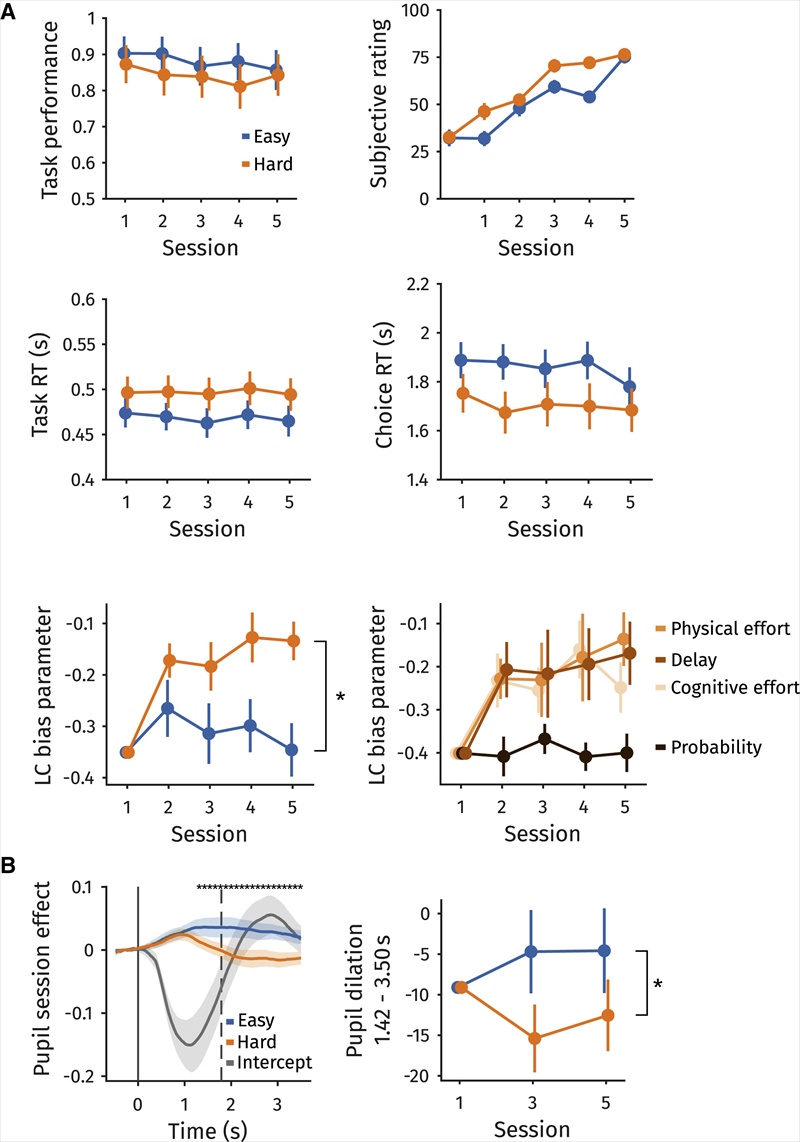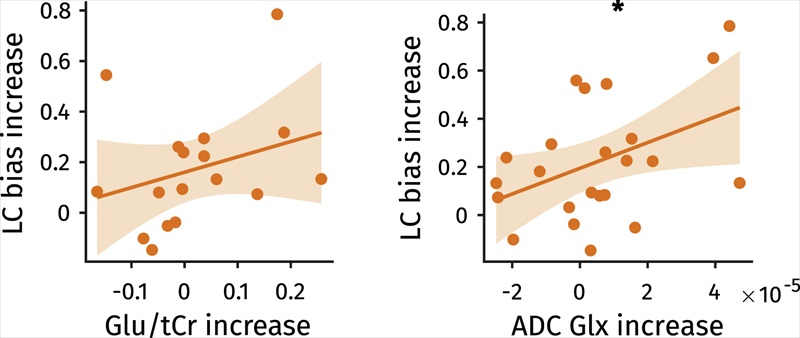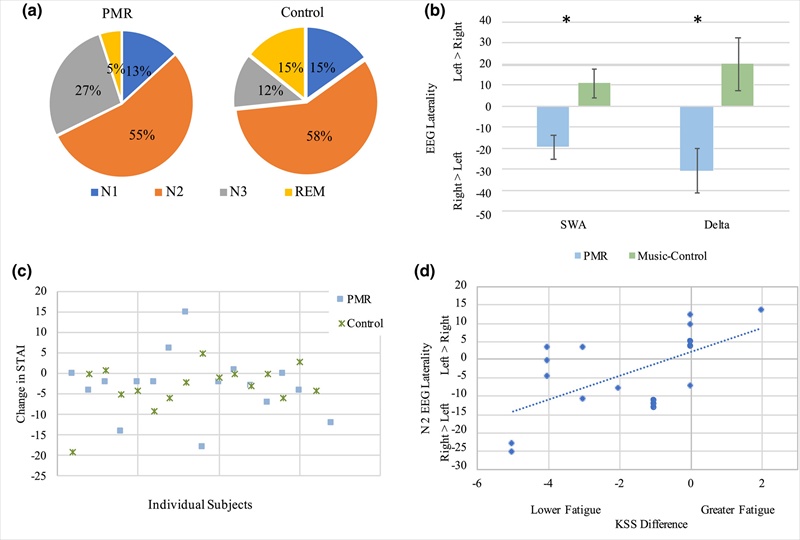Why do I feel tired after a meeting?
I often feel tired after sitting for over an hour studying or after a meeting. Why do I feel tired even though I haven’t done any physical work that uses my body?
The brain works without resting even a second in its life. Even when you sleep, the neurons in your brain are constantly exchanging information. Neurotransmitters are responsible for communicating information. Neurotransmitters are secreted into the synapse of one neuron and transmit a signal to another neuron. Each neuron uses materials in the blood to synthesize neurotransmitters. Representative neurotransmitters include acetylcholine, monoamines (dopamine, norepinephrine, serotonin), amino acids (glutamate, GABA, glycine), various peptides (compounds consisting of two or more amino acid molecules), gas (carbon monoxide, carbon dioxide), etc. There is this.
▲ Experimental design of behavioral measurement of cognitive fatigue (Source: Current Biology)
If you focus on one task for a long time, glutamate builds up in the brain, causing fatigue.
Recently, the Paris Brain Research Institute (PBI) conducted an interesting study on cognitive activity and the brain. The research team recruited 40 participants to find out what causes cognitive fatigue and how it affects them from a neurometabolism perspective. The 40 participants were healthy people with no mental illness and no functional brain abnormalities.
The research team divided the group into a difficult cognitive activity group (tasks that required a lot of reflection – 24 people) and an easy cognitive activity group (tasks that were easy to manage – 16 people). To determine the source of cognitive fatigue, brain activity was monitored throughout the day with magnetic resonance spectroscopy (MRS), a representative non-invasive imaging method that provides information on cellular activity (metabolic information). Two groups were assigned each problem situation (a task that required a lot of thought, a task that could be easily tackled) and while lying on a brain scanner, they observed the brain changes as they solved the problem. they were secret.
Glutamate is a key excitatory neurotransmitter in the central nervous system, plays an important role in memory, and accounts for 15 to 20% of the central nervous system. Glutamate is a key substance responsible for over 90% of information transfer between neurons. In order to maintain regular brain function, it is necessary to maintain a close reciprocal balance with the inhibitory neurotransmitter ‘GABA’.
If the amount of glutamate is too large, it acts as excitotoxicity on neurons, which leads to lack of oxygen and necrosis of neurons. Glutamate increases when certain blood vessels in the brain are blocked and if blood vessels are blocked and oxygen is not supplied, the amount of glutamate increases, causing necrosis of surrounding neurons and brain damage.

▲Behavioral consequences of cognitive fatigue (Source: current biology)
After a six-hour cognitive activity test (memory test), the glutamate levels of the participants who solved the high-difficulty problem increased significantly more than when the experiment began. Dilated pupils were also observed, a physical symptom of fatigue. The glutamate levels of the participants who solved the easy problem were almost the same as in the beginning. The easy cognitive activity group also complained of some fatigue, but no pupil dilation occurred. Except for glutamate, seven other chemicals remained unchanged.
To see how cognitive fatigue affects decision making, the research team conducted a survey to choose whether to receive a small amount of money right away or receive more money later. In the difficult cognitive activity group, many replied that they would receive a small fee immediately. The researchers determined that the more difficult cognitive activity group felt more fatigued and made impulsive choices 10% more likely due to the influence of glutamate.
This study found that focusing on work for a long time causes glutamate, a neurotransmitter, to build up in the prefrontal cortex at the front of the brain, cause brain fatigue, and affect decision-making. However, we did not monitor the glutamate itself, but monitored the phenomenon related to the accumulation of glutamate (synthesis of GABA) and we did not find the cause of the cognitive control region that accumulates more glutamate than other regions such as the visual cortex. Additionally, no studies have been conducted to examine the recovery of glutamate levels during rest or sleep, so no studies have been conducted on how much glutamate is reduced or recovered. It’s hard to generalize because it’s not a study that involves a lot of people, but it’s a study that confirmed that glutamate builds up in the brain and has a high chance of making impulsive choices. The study was published in the journal Current Biology.[1]

▲Correlation Between Behavioral and Magnetic Resonance Spectroscopy (MRS) Cognitive Fatigue Measurements (Source: Current Biology)
Progressive muscle relaxation to induce deep sleep
The best way to balance and harmonize neurotransmitters is deep sleep. A recent sleep study revealed that when GABA receptors in the body combine with GABA, it suppresses neuronal arousal and results in a good night’s sleep with mental stability. By using (regulating) the sleep-inducing neurotransmitter GABA, you can achieve deep sleep without side effects.
GABA (gamma-amino-butyric acid) is one of the amino acids that acts in the brain and has a function of suppressing excitability, and represents about 30% of the neurotransmitters of the central nervous system. It is a very important substance for the human body as it exists in a concentration that is 200 to 1,000 times higher than that of other neurotransmitters. The neurotransmitter GABA in vivo improves blood flow to the brain and increases the oxygen supply to the brain. It also acts as a brake on the brain, reducing neuronal activity in the central nervous system, promoting sleep, reducing mental stress, lowering anxiety and helping to get rid of various addictions and helps calm mood. However, excessive secretion of the neurotransmitter GABA causes hypersomnia, hot flashes, nausea, and gastrointestinal upset.

▲Progressive Muscle Relaxation (PRM) increases slow-wave sleep during sleep. (Source: Wily Online Library)
To get sound sleep, you need to fall asleep while your body is relaxed. A recent study in the United States found that intentionally straining and relaxing muscles leads to deeper sleep and improves sleep patterns. A total of 50 college students (26 male, 24 female) (mean age 20.17 years) were recruited to conduct a sleep study. The group listened to music in a comfortable environment. As a result of the EEG analysis during sleep, the group that received progressive muscle relaxation slept 125% deeper than the group that listened to music, and their sleep patterns also improved.[2]
Gradual muscle relaxation is a method of artificially increasing muscle tension to its maximum and thereby relaxing it. Here are some gradual muscle relaxation techniques you can do before bed. Close your eyes tightly and slowly open them at least 2 times, then clench your fists for 10 seconds and then release them repeatedly. Then, clench your fists, bend your arms in front of your chest, hold the position for 5 seconds, then repeat the stretch and raise and lower movements of the shoulders as hard as possible. Then, sit in a chair and repeat by raising and lowering your legs as you pull your toes towards your body so as to pull the calf muscles. Repeat 2 times before going to bed for a good night’s sleep.
[1] Antonius Wiehler, Francesca Branzoli, Isaac Adanyeguh, Fanny Mochel, Mathias Pessiglione (2022), A neuro-metabolic account of because daylong cognitive work altera the control of economic decision, Current Biology, 11 August 2022 (https://doi.org/10.1016/j.cub.2022.07.010).
[2] Katharine C. Simon, Elizabeth A. McDevitt, Rocco Ragano, Sara C. Mednick (2022), Progressive Muscle Relaxation Increases Slow Wave Sleep During a Day Nap, Wily Online Library, March 30, 2022 (https://doi.org/10.1111/jsr.13574).
to write. Cho Yong-hwan
Nationally recognized brain trainer. A YouTube channel that introduces interesting brain stories and mental health training He manages “Brain and Mind Health of Joe and Yeo”.
(1)(1)(1)(1).jpg?fit=%2C&ssl=1)

